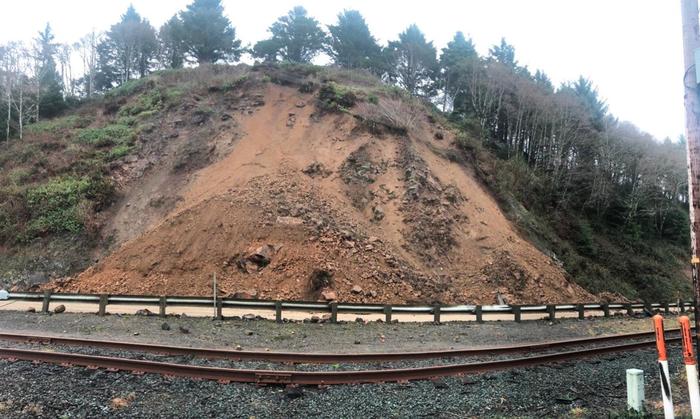A three-month program that placed 18 plastic traffic barrels in a six-block radius of Southeast Portland’s Mount Scott-Arleta neighborhood helped reduce shootings by 64%, Commissioner Jo Ann Hardesty said Tuesday.
The Portland Bureau of Transportation started the pilot program in October at the request of residents who said people were routinely shooting guns then fleeing on roads near 72nd Avenue and Woodstock Boulevard. The Mt. Scott-Arleta Neighborhood Association had asked Hardesty, who oversees the transportation bureau, to install the barrels as a traffic-calming measure.
“I would not say the barrels by itself stopped anything bad from happening, but it was the community coming together saying, ‘If we work together, we can figure this out,’” Hardesty said during a news conference outside of the Mt. Scott Community Center. “I used the bureaus that I have in my portfolio to actually address the critical issues that we’re facing today.”
The pilot program also increased park ranger and police patrols, updated the lighting at Mount Scott Park, and encouraged area business owners to install security cameras, Hardesty said.
The pilot program officially ended in December, but the barrels remain set up in the neighborhood.
The Portland Police Bureau said in a statement that other measures the agency took independently of the pilot program — including “saturating the area with officers” and investigating occupied, stolen vehicles — led to a nearly 80% drop in area shootings between late September and mid-January. The agency said its efforts also resulted in 63 arrests and the seizure of three guns during that time.
Hardesty’s figures compare the number of shootings during the three-month pilot program to the three months before the barrels were installed.
Deputy Chief Mike Frome said in a statement provided by Hardesty’s office that the Police Bureau was “happy to partner” with Portland Parks & Recreation rangers to patrol the area.
“Efforts like this demonstrate how the City of Portland can address problems like gun violence in a holistic manner, rather than treating it as a purely police issue,” Frome’s statement said.
A neighborhood survey conducted after the three-month pilot showed that twice as many respondents thought the program’s measures reduced traffic from people fleeing shootings, when compared to respondents who didn’t perceive a difference, Hardesty said.
Commissioner Carmen Rubio, who oversees Portland Parks & Recreation, said that during the three-month program, park rangers asked for help from police officers or firefighters in 2% of the rule violations they addressed at Mount Scott Park.
“Like Portland Street Response, rangers are helping to ensure Portland police and fire (bureaus) are able to focus on higher need public safety matters,” Rubio said. “This is a public safety win.”

Transportation bureau spokesperson Dylan Rivera said he hopes the city will approve funding to replace the 18 plastic barrels with permanent cement planters.
The transportation bureau is also asking for money to install curbs and on-street parking near Arleta Triangle, a plaza near 72nd Avenue and Woodstock Boulevard, to make it more of a “community-centered environment,” Rivera said.
Matchu Williams, chair of the Mt. Scott-Arleta Neighborhood Association, said he has seen a “day and night” difference since the traffic barrels were installed.
“We went from shootings every night, five nights in a row, to almost no shootings at the park for nearly two months,” said Williams, 37, who has lived in the neighborhood for eight years. “It was like a sigh of relief.”
Williams said shootings in the neighborhood reached “critical urgency” last summer. One incident left dozens of bullet casings littering the ground near Mount Scott Park, he said, and the area around Arleta Triangle had become a “staging ground” for shootings and reckless driving.
Neighbors would hear daytime gunshots while walking their children to Mount Scott Park. At night, residents would emerge from their homes to check their walls for bullet holes. Some neighbors said they had taken to hiding their children in the bathtub to protect them from bullets, according to Williams.
Neighborhood residents began calling the Portland Police Bureau’s non-emergency line “nonstop” in May and June to ask for help addressing the shootings, but “they said our hands are tied — we don’t have the resources,” Williams said.
The neighborhood association then turned to Hardesty’s office to ask for the temporary traffic barrels.
Williams said he hopes the success of the pilot program will lead to more barrels — and eventually permanent cement planters — being installed at shooting “hotspots” around Portland as the city continues to reel from gun violence.
At least 92 people were killed in Portland homicides in 2021, a record, and there have been 21 homicides throughout the city so far this year.
While journalists gathered Tuesday morning at Arleta Triangle, a woman pulled her car up and yelled out of the window.
“I live right there,” she said, pointing at an apartment building across the street from the intersection. “I’ve got bullet holes under my bedroom window.”
“We’re going to make it better,” Hardesty called back.
--Catalina Gaitán
Note to readers: if you purchase something through one of our affiliate links we may earn a commission.
